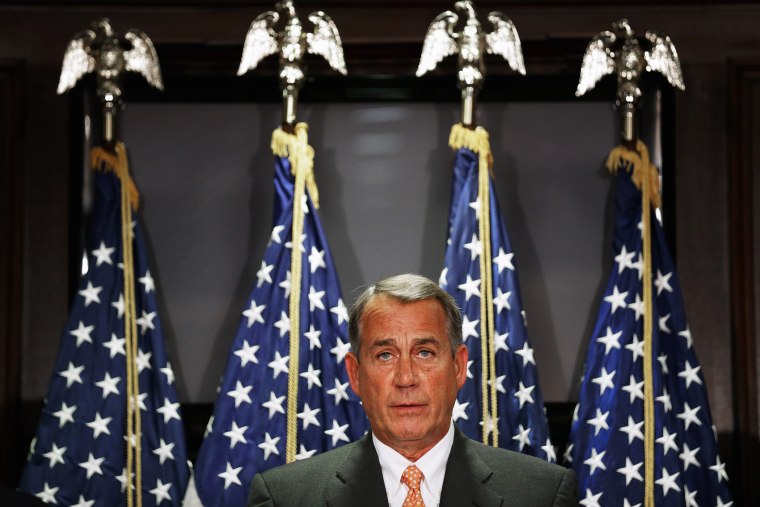With war in Iraq suddenly back in style, Dick Cheney met with House Republicans on Tuesday to bash President Obama's foreign policy and stump for more defense spending.
Cheney's visit marked a sort of coming out party for Republican hawks, who polls show are rapidly gaining support among GOP voters after years in which the non-interventionists, led by Cheney nemesis Rand Paul, had the momentum.
"It was a great message -- and something we needed to hear and hopefully it sticks with a lot of my colleagues who kind of had this creep towards isolationism," Rep. Adam Kinzinger (R-Ill.) told the Los Angeles Times. "Hopefully this is an awakening that we have to be very strong and very serious."
Rep. John Fleming (R-LA) told The Daily Beast that Cheney accused Obama of “facilitating the Muslim Brotherhood," the Islamic movement that won elections in Egypt only to be deposed by the military, while CNN reported that Cheney dinged Obama for not demanding the US leave a residual force behind while negotiating a withdrawal with the Iraqi government.
The reemergence of Cheney, whose legacy of expansive executive power and aggressive foreign policy is still controversial even within the GOP, comes as Congressional leaders are trying to determine how to respond to Obama's escalating campaign against the Islamic State.
On Tuesday, Republican House Speaker John Boehner declined to commit to Congressional votes on military action against ISIS – or to rule out ground troops – until after he meets with the White House to hear their broader plan.
“We have a very serious problem that demands a strategy and, until there is a strategy, there is no reason to talk about any of the specifics,” Boehner told reporters.
On the Senate side, Minority Leader Mitch McConnell also called on Obama to offer Congress a clear plan of action.
"Now that the president has conducted initial consultations with our allies, and stated his objective to degrade and destroy ISIL, it's time to present a strategy to Congress,” McConnell said on the Senate floor. "I hope he will begin to do that today.”
"It’s an election year. A lot of Democrats don’t know how it would play in their party, and Republicans don’t want to change anything. We like the path we’re on now. We can denounce it if it goes bad, and praise it if it goes well and ask what took him so long."'
The two top Republicans, along with Democratic Senate Majority Leader Harry Reid and House Minority Leader Nancy Pelosi, are gathering at the White House today to discuss the conflict against the Islamic State of Iraq and Syria (ISIS). Reid and Pelosi have also so far kept mum on whether a vote is necessary in the short or long term.
All four have reason to be wary about committing themselves decisively to a vote. After Obama requested authorization for a limited strike against Syrian dictator Bashar al-Assad’s regime in response to its alleged use of chemical weapons, Boehner, Pelosi, and Reid endorsed the move only to meet a wall of opposition from the public and lawmakers from both parties, including McConnell. Obama ended up striking a deal to remove the weapons from Syria instead, so no votes were needed.
Despite calls from some in the GOP — most notably Kentucky Sen. Rand Paul — to vote on some form of authorization for strikes immediately, it’s possible nothing will pass before November. Congress is in session for only two weeks before breaking for the midterm elections, and the White House is likely to pursue further action, as it has with the over 100 airstrikes already conducted so far, based on existing authority.
Republican Congressman Jack Kingston of Georgia told The New York Times he favors a vote on authorization, but offered a blunt assessment as to how the politics of the moment made such a move unlikely.
“A lot of people would like to stay on the sideline and say, ‘Just bomb the place and tell us about it later,’” Kingston said. “It’s an election year. A lot of Democrats don’t know how it would play in their party, and Republicans don’t want to change anything. We like the path we’re on now. We can denounce it if it goes bad, and praise it if it goes well and ask what took him so long.”
Even among members who support action against ISIS, there are concerns about how Congress should approach the issue — making the debate more complicated than a simple yes or no vote. Some lawmakers want restrictions on the use of ground troops, for example, or a timetable that would require Obama to seek regular reauthorization. Libertarian-minded Democrats and Republicans are wary of providing too lose a leash given that the brief Authorization for Use of Military Force (AUMF) that Congress passed in 2001 ended up being used to justify everything from drone attacks to indefinite detention.
“It may be the president needs to come back to Congress often, but I think that’s as it should be and I think there’s a great number of people on both sides of the aisle that, given the current broad interpretation of the current AUMF, there will be a great skepticism with the new AUMF,” Congressman Adam Schiff told NBC News on Monday.
